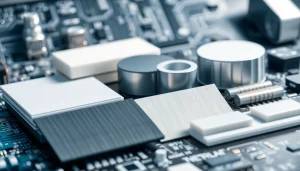Choosing the Right Power Supply Manufacturer: Essential Factors for Quality and Reliability

The Importance of Selecting the Right Power Supply Manufacturer
Choosing the right power supply manufacturer (PSU) is crucial for ensuring your electronic devices perform efficiently and reliably. A quality power supply not only affects the performance of individual components but also the overall stability and longevity of your system. You may find that navigating the multitude of options available can be overwhelming, which is where informed choices and understanding the dynamics of power supply manufacturing come into play. For further details, you can explore the offerings of a reputable Power Supply Manufacturer.
Understanding Power Supply Functions
A power supply unit (PSU) has the primary function of converting electrical power from one form to another, ensuring that the devices connected to it receive the appropriate voltage, current, and stability. The two common types of PSUs are:
- AC-DC Power Supplies: Converts alternating current (AC) to direct current (DC), typically used in most consumer electronics.
- DC-DC Converters: Converts one DC voltage to another, primarily used in devices that require specific voltage levels.
Each type has its unique applications ranging from powering desktop computers to industrial machinery. Understanding these functions helps in determining the right specifications for your needs.
Key Factors in Choosing Manufacturers
Selecting a power supply manufacturer involves several critical factors, including:
- Reliability: A reputable manufacturer consistently delivers quality products that operate without failure.
- Market Reputation: Trusted manufacturers usually have good reviews and feedback from users and industry experts.
- Product Range: The ability to provide a diverse range of products ensures that the manufacturer can meet specific requirements for various applications.
- Support and Warranty: Good after-sales support and robust warranty policies reflect a manufacturer’s confidence in their product quality.
By considering these factors, you can ensure that you choose a manufacturer who will provide a power supply that meets not only your performance needs but also your reliability expectations.
Common Pitfalls in Power Supply Selection
It is easy to fall into common traps when selecting a power supply manufacturer. These may include:
- Choosing Based on Price Alone: While budget considerations are important, sacrificing quality for a lower price can lead to a lack of reliability and potentially higher replacement costs in the long run.
- Ignoring Compatibility: Not all power supplies work with every system. It is critical to consider voltage ratings, connector types, and wattage to ensure compatibility.
- Overlooking Reviews and Certification: Absence of reviews or certifications can indicate potential quality issues. Engaging with community forums can provide insights from other users on manufacturer reliability.
Being aware of these pitfalls can be invaluable in securing a dependable power supply that serves its purpose effectively.
Top Power Supply Manufacturers to Consider
The power supply market is populated with a variety of manufacturers, each offering unique strengths and capabilities. Here, we showcase a few leading names in the industry.
Comparing Leading Brands
Some of the top names in power supply manufacturing include:
- Corsair: Known for high-quality PSUs, particularly the RM and RMx series, which cater to gamers and PC builders.
- Seasonic: Renowned for efficiency and reliability, often lauded in PC building communities.
- EVGA: Offers a wide product range, favored for its performance and robust features tailored to gamers.
- Mean Well: A leader in industrial and medical power supplies, celebrated for their durability and wide application range.
Analyzing the characteristics of these brands can help consumers make a well-informed choice tailored to their power requirements.
Unique Technologies Offered
Manufacturers leverage unique technologies to stay competitive in the market. For instance:
- Modularity: Some manufacturers offer modular PSU designs, allowing users to attach only the cables needed for their specific build, reducing clutter and improving airflow.
- Digital Monitoring: Advanced PSUs come with features to monitor voltage, temperature, and power consumption through dedicated software, helping users optimize performance.
- Active PFC (Power Factor Correction): Enhances efficiency, reduces energy waste, and complies with various energy regulations.
Such technologies can significantly enhance user experience and operational efficiency in power supply usage.
Product Range and Specifications
Different manufacturers provide a variety of products with distinct specifications. Key specifications to consider include:
- Wattage Ratings: Ensures the power supply can handle the demands of connected components.
- Efficiency Ratings: Most quality power supplies showcase an 80 PLUS certification, indicating energy efficiency and lower heat output.
- Form Factor: Depending on the case size and layout, the PSU must fit correctly in your system.
- Cooling Systems: Active cooling (with fans) vs. passive cooling (fanless) can impact noise levels and thermal performance.
Understanding these specifications helps users to align their requirements with what manufacturers offer, ensuring an optimized performance.
Evaluating Manufacturer Certifications and Standards
Certifications and standards play an integral role in assuring that a power supply unit is safe and reliable. Manufacturers must adhere to various industry standards that guarantee product performance and safety.
ISO and Quality Certifications
Manufacturers with ISO certifications demonstrate a commitment to maintaining quality management systems. For example:
- ISO 9001: Indicates effective quality management practices.
- ISO 14001: Demonstrates effective environmental management.
- IEC Standards: These are critical for safety and performance regarding electrical devices.
Assessing these certifications can significantly enhance trust in a manufacturer and their products.
Customer Feedback and Industry Reputation
Feedback from customers and industry reviews are crucial in assessing a manufacturer’s reputation. Key sources include:
- Online Reviews and Ratings: Platforms like Amazon or Newegg often provide valuable user insights.
- Tech Forums and Communities: Websites like Reddit and PCPartPicker allow users to discuss and post experiences regarding different PSUs.
- Industry Reports: Studies from publications can inform you about the latest trends and manufacturer standings.
Gathering feedback from diverse sources helps shape a comprehensive view of a manufacturer’s standing.
Importance of Warranty and Support
A manufacturer’s warranty and level of customer support are paramount for post-purchase services. Key points include:
- Warranties: Longer warranties often indicate confidence in product longevity.
- Customer Service: Responsive support services help resolve issues and process returns effectively.
These elements reassure customers of a manufacturer’s commitment to quality and their readiness to assist with technical queries or product replacements.
How to Ensure Compatibility with Your System
Ensuring compatibility of a power supply unit with your system is critical to maximizing performance and operational stability. Neglecting this can lead to severe issues including hardware failures or underperformance.
Power Requirements for Different Applications
Understanding power requirements based on individual applications is crucial. General guidance includes:
- Gaming PCs: Typically need higher wattage to support power-hungry graphics cards and processors.
- Office Computers: Require lower wattage, usually under 500W.
- Workstations: Might demand even more due to multiple GPUs and higher specifications.
Defining your application’s requirements ensures you select a PSU that delivers the necessary wattage while remaining efficient.
Connector Types and Specifications
Different components have unique connector requirements, such as:
- Molex Connectors: Commonly used for older components like hard drives and optical drives.
- SATA Connectors: Standard for modern SSDs and HDDs.
- 8-Pin and 24-Pin ATX Connectors: Required for connecting the motherboard and GPU.
Confirming compatibility of connectors ensures proper power distribution across components.
Testing and Benchmarks
Having a solid understanding of the power supply’s performance can significantly affect overall system efficiency. Important aspects include:
- Load Testing: It is advisable to test the PSU under maximum load to assess stability and efficiency at typical and peak performance conditions.
- Consumer Reviews: Utilize benchmarking sites that test PSUs to obtain statistical performance data relating to efficiency and voltage stability.
Regular testing ensures that users can maintain a reliable and efficient system.
Future Trends in Power Supply Manufacturing
As technology continues to evolve, power supply manufacturing is witnessing significant changes driven by innovation and consumer demands.
Emerging Technologies in Power Supplies
Some of the emerging technologies influencing power supply units include:
- Digital PSUs: These incorporate smart monitoring and adaptive performance adjusts based on load and demand.
- Power Supply with Integrated Battery Backup: Providing uninterruptible power in environments susceptible to outages.
- Improved Thermal Management: Technologies aimed at enhancing cooling efficiency thereby prolonging PSU life, including heat dissipation systems and fanless designs.
Such innovations are characteristic of a forward-thinking manufacturer, enhancing not only performance but user experience as well.
Sustainability and Eco-Friendly Designs
Manufacturers are increasingly prioritizing sustainability initiatives within their operations. Strategies may include:
- Energy Efficient Designs: Employing materials and technologies that reduce energy consumption standards within sustainable ranges.
- Recyclable Materials: Utilizing eco-friendly packaging and product casing from recyclable materials to lessen environmental impact.
Adopting these practices resonates with environmentally conscious consumers, increasingly important in the competitive landscape.
Market Predictions and Innovations
Looking ahead in the power supply market implies several trends could shape future demands:
- Increased Customization: More bespoke solutions to match specific consumer requirements based on technology advancements.
- Integration with IoT Devices: Power supplies designed specifically for IoT applications with smart connectivity.
These predicted trends haunt traditional paradigms, suggesting growth opportunities for agile manufacturers capable of adapting quickly to market dynamics.






